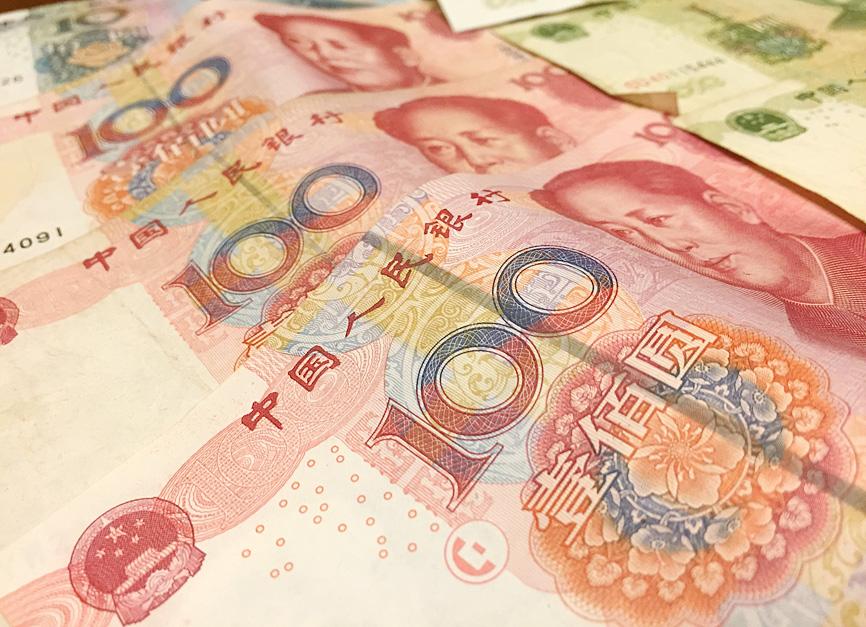Chinese yuan deposits held by local banks last month declined 0.91 percent to 225.32 billion yuan (US$34.66 billion), shrinking for a fourth consecutive month, as corporate and retail clients adjusted asset portfolios amid inflation expectations and geopolitical tensions, the central bank said on Tuesday.
The decrease was related to personal and corporate decisions regarding asset allocation strategies, and was not connected to political circumstances, the bank said.
Major Asian currencies have been hit hard this year, partly by US Federal Reserve rate hike expectations and the Japanese yen weakening 10.11 percent against the US dollar, it said.

Photo: Kelson Wang, Taipei Times
The New Taiwan dollar fared better with a 5.27 percent correction, while the Chinese yuan held firm with a 0.04 percent dip, making it the best performer in the region, it said.
Yuan deposits at domestic banking units dropped 1.49 percent to 196.76 billion yuan after retail and corporate clients trimmed positions, the central bank said, adding that a major electronics firm had used yuan deposits for goods payments.
Yuan deposits at offshore banking units rose 3.24 percent to 28.56 billion yuan after some firms converted US dollar deposits into yuan holdings to meet yuan settlement needs, the bank said.

In Italy’s storied gold-making hubs, jewelers are reworking their designs to trim gold content as they race to blunt the effect of record prices and appeal to shoppers watching their budgets. Gold prices hit a record high on Thursday, surging near US$5,600 an ounce, more than double a year ago as geopolitical concerns and jitters over trade pushed investors toward the safe-haven asset. The rally is putting undue pressure on small artisans as they face mounting demands from customers, including international brands, to produce cheaper items, from signature pieces to wedding rings, according to interviews with four independent jewelers in Italy’s main

Macronix International Co (旺宏), the world’s biggest NOR flash memory supplier, yesterday said it would spend NT$22 billion (US$699.1 million) on capacity expansion this year to increase its production of mid-to-low-density memory chips as the world’s major memorychip suppliers are phasing out the market. The company said its planned capital expenditures are about 11 times higher than the NT$1.8 billion it spent on new facilities and equipment last year. A majority of this year’s outlay would be allocated to step up capacity of multi-level cell (MLC) NAND flash memory chips, which are used in embedded multimedia cards (eMMC), a managed

Japanese Prime Minister Sanae Takaichi has talked up the benefits of a weaker yen in a campaign speech, adopting a tone at odds with her finance ministry, which has refused to rule out any options to counter excessive foreign exchange volatility. Takaichi later softened her stance, saying she did not have a preference for the yen’s direction. “People say the weak yen is bad right now, but for export industries, it’s a major opportunity,” Takaichi said on Saturday at a rally for Liberal Democratic Party candidate Daishiro Yamagiwa in Kanagawa Prefecture ahead of a snap election on Sunday. “Whether it’s selling food or

In the wake of strong global demand for AI applications, Taiwan’s export-oriented economy accelerated with the composite index of economic indicators flashing the first “red” light in December for one year, indicating the economy is in booming mode, the National Development Council (NDC) said yesterday. Moreover, the index of leading indicators, which gauges the potential state of the economy over the next six months, also moved higher in December amid growing optimism over the outlook, the NDC said. In December, the index of economic indicators rose one point from a month earlier to 38, at the lower end of the “red” light.